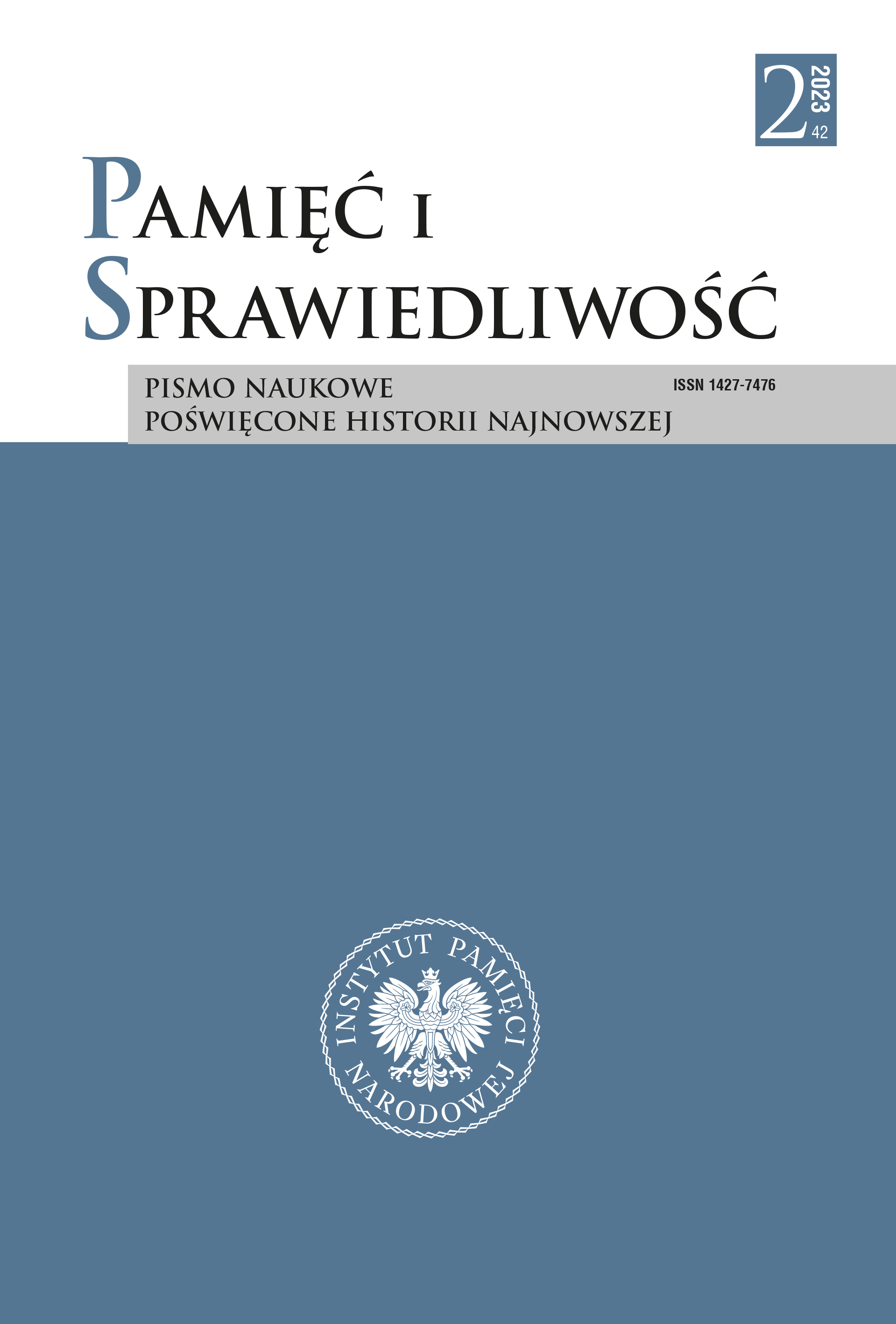Relacje prymasa Polski kard. Augusta Hlonda z reżimem komunistycznym w latach 1945–1948
Remembrance and Justice, Vol. 42 No. 2 (2023), pages: 400-418
Publication date: 2024-04-03
 https://doi.org/10.48261/pis234216
https://doi.org/10.48261/pis234216
Abstract
In the last years of his life, Cardinal August Hlond was surrounded by the aura of the steadfast Primate of Poland, who never recognised the communist regime, never met
the communist president Bolesław Bierut and did not make any concessions to the communists. In church circles, this attitude was contrasted with the attitude of Primate Stefan
Wyszyński, who concluded an agreement with the government in 1950 (this assessment was only changed by the famous was only changed by the famous “Non possumus” and his arrest). This article is based
mainly on the extensive biography Pełnia prymasostwa. Ostatnie lata prymasa Polski kardynała Augusta Hlonda 1945–1948 [Height of primacy. The last years of the Primate
of Poland, Cardinal August Hlond, 1945–1948] (Poznań 2009), written by the author of this article on the basis of many sources, often previously unknown or unavailable,
as well as previous literature. Its purpose is to show the primate’s attitude towards the regime in Poland. Primate August Hlond, who returned to the country from war emigration, was aware of the need to start talks with the communist regime and to normalise church life, especially after the breaking of the concordat. However, he believed that talks should be conducted only on specific issues, while maintaining the independence of the Church. He personally contacted only the Poznań voivode (provincial governor), Feliks Widy-Wirski, and the deputy minister of administration, Władysław Wolski. The talks basically con-
cerned one issue – the authorities’ demand that the Primate pay a visit to the President of the National Council of the Judiciary, Bolesław Bierut. The repression and fraud used by the regime during the referendum resulted in the Primate and the Episcopate sending a confidential memorandum to the authorities, in which they demanded an improvement in the situation of the Church and the nation in the state. As a result of this step, official
talks began between representatives of the episcopate and the government. The regime treated them instrumentally, interrupted them many times, nor it did keep the promi-
ses it had made, but rather it abandoned its policy of repression, and even intensified it. Cardinal Hlond, however, believed that the talks should continue. He was ready to meet Bierut (which he had previously ruled out) and began correspondence with him. This was
not due to political naivety, but to prudence and the “necessity of the moment”. Although these talks did not achieve much, they delayed the upcoming crackdown between the communists and the Church and gave them more time to mobilise their forces before the general trial.
The article slightly corrects the opinion about Cardinal Hlond as a steadfast and unyielding primate – an interrex who did not recognise the communist president and never met him, despite the regime’s efforts – but this does not diminish his greatness and merits.
References
Archiwum Archidiecezjalne w Gnieźnie (AAG), Akta Prymasa Polski 1945–1948 (APP);
Archiwum Archidiecezjalne w Gnieźnie (AAG), Acta Hlondiana (AH), Materiały do życia i działalności Kardynała Augusta Hlonda Prymasa Polski 1981–1948, zebrał ks. Stanisław Kosiński, Ląd nad Wartą 1966–1991 (mps).
Archiwum Sekretariatu Episkopatu Polski w Warszawie (ASEP), Akta bp. Zygmunta Choromańskiego, Rozmowy z przedstawicielami rządu 1946–1948.
Fijałkowska B., Partia wobec religii i Kościoła w PRL, t. 1: 1944–1955, Olsztyn 1999 (aneks: Wybór dokumentów).
Hlond A., Dzieła, t. 1: Nauczanie 1897–1948, red. J. Konieczny, Toruń 2003.
[Hlond A.], Z notatnika Kardynała, oprac. W. Necel, Poznań 1995.
Korespondencja Augusta Hlonda i Józefa Gawliny w latach 1924–1948, wyd. i oprac. J. Myszor, J. Konieczny, Katowice 2003.
Krucki Ł., Nieznany raport prymasa Augusta Hlonda o sytuacji Kościoła katolickiego w Polsce po przeprowadzeniu wyborów do Sejmu Ustawodawczego z 19 I 1947 r., „Nasza Przeszłość” 2014, t. 122.
Komunikaty Konferencji Episkopatu Polski 1945–2000, oprac. J. Żaryn, Warszawa 2006.
Listy pasterskie Episkopatu Polski 1945–1975, Paris 1975.
Raina P., Kościół w PRL. Kościół katolicki w świetle dokumentów 1945–1989, t. 1: Lata 1945–1959, Poznań 1994.
Sopicki S., Kardynał Hlond wobec okupantów. Przemówienie na akademii w Ognisku Polskim dnia 6 XII 1948 [w:] Bożemu Nauczycielowi Narodu Wielkiemu Prymasowi Polski X.Augustowi Hlondowi 5 VII 1881 – 22 X 1948 Arcybiskupowi Metropolicie Gnieźnieńskiemu i Warszawskiemu, Opiekunowi Polskiego Wychodźstwa i Duszpasterstwa Polskiego za granicą w pośmiertnym hołdzie, Londyn [1949]
Widy-Wirski F., Wspomnienia wojewody, Warszawa 1980.
Żaryn J., Stolica Apostolska wobec Polski i Polaków w latach 1944–1958 w świetle materiałów ambasady RP przy Watykanie (Wybór dokumentów), Warszawa 1998.
Dudek A., Państwo i Kościół w Polsce 1945–1970, Kraków 1995.
Kosiński S., August Hlond 1926–1948 [w:] Na stolicy prymasowskiej w Gnieźnie i Poznaniu. Szkice o prymasach Polski w okresie niewoli narodowej i II Rzeczypospolitej, red. F. Leonort, Poznań 1982.
Krasowski K., Państwo a Kościół katolicki w Polsce 1945–1955, Poznań 1997.
Pietrzak J., Pełnia prymasostwa. Ostatnie lata prymasa Polski kardynała Augusta Hlonda 1945–1948, t. 1–2, Poznań 2009.
Wilk S., Kard. August Hlond jako organizator życia kościelnego w Polsce po II wojnie światowej. Nadzwyczajne uprawnienia papieskie dla prymasa Polski (8 VII 1945) [w:] Il Primate di Polonia Card. August Hlond di fronte ai grandi conflitti dell’epoca: la Secondo guerra mundiale e guerra fredda / Prymas Polski kard. August Hlond wobec wielkich konfliktów epoki: drugiej wojny światowej i zimnej wojny, red. L. Kuk, S. Zimniak, Roma 2012.
Zimniak S., Stanowisko prymasa Augusta Hlonda wobec systemów totalitarnych: nazistowskiego i sowieckiego [w:] Il Primate di Polonia Card. August Hlond di fronte ai grandi conflitti dell’epoca: la Secondo guerra mundiale e guerra fredda / Prymas Polski kard. August Hlond wobec wielkich konfliktów epoki: drugiej wojny światowej i zimnej wojny, red. L. Kuk, S. Zimniak, Roma 2012.
Żaryn J., Kościół a władza w Polsce (1945–1950), Warszawa 1997.
License
Copyright (c) 2023 Pamięć i Sprawiedliwość

This work is licensed under a Creative Commons Attribution-NonCommercial-NoDerivatives 4.0 International License.
 Język Polski
Język Polski
 English
English
 Deutsch
Deutsch
 Français (France)
Français (France)
 Italiano
Italiano
 Русский
Русский


 PDF (Język Polski)
PDF (Język Polski)




